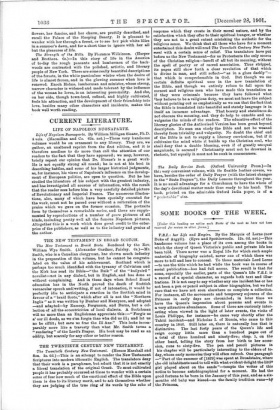THE TWENTIETH CENTURY NEW TESTAMENT.
The Twentieth Century New Testament. (Horace Marshall and Son. 3s. 6d.)—This is an attempt to render the New Testament Scriptures into modern idiomatic English. The translators deny that their work is a paraphrase, but admit that it is not exactly a literal translation of the original Greek. To most cultivated people it has probably occurred at times to wonder with a certain sense of fear how much of the emotional effect of the Bible upon them is due to its literary merit, and to ask themselves whether they are judging of the true ring of its words by the echo of response which they create in their moral nature, and by the satisfaction which they offer to their spiritual hunger, or whether they are not to a great extent mistaking the esthetic for the religious sense. We think that all those who have for a moment entertained this doubt will read The Twentieth Century New Testa- ment with a certain sense of relief. The translators have put before us the New Testament—for us Protestants the only source of the Christian religion—bereft of all but its meaning, without the spell of poetry or of sacred association. Thus stripped, its pages still show forth a clear revelation of that which is divine in man, and still reflect—" as in a glass darkly "— that which is comprehensible in God. But though we see certain definite spiritual uses in the new translation of the Bible, and though we entirely refuse to fall upon the earnest and religious men who have made this translation as if they were criminals because they have followed what they believe to be a religious duty, we must not leave the subject without pointing out as emphatically as we can that the fact that the Bible is translated into beautiful and stately language is in itself an immense advantage. That beauty and stateliness do not obscure the meaning, and they do help to ennoble and un- vulgarise the minds of the readers. The educative effect of the literary glories of the Authorised Version has been great beyond description. No man can study the Bible and not be weaned thereby from triviality and vulgarity. No doubt the chief end of the Bible is not to supply a literary curriculum, but if it cultivates the mind while it builds up the Christian soul, who shall deny that a double blessing, even if of greatly -unequal magnitude, is secured ? Christianity must not be drowned in rhetoric, but equally it must not be sunk in commonness.


































 Previous page
Previous page